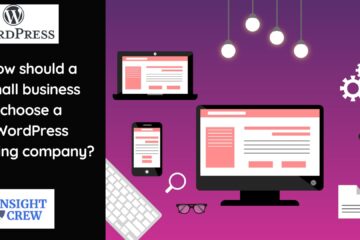If you’re unsure of why to use WordPress, read on. You’ve arrived at the proper location. If you’re considering this, it indicates you’ve either done some preliminary study on WordPress or have heard about it from a friend or coworker. But it doesn’t mean you’ve thoroughly assessed the advantages and disadvantages or examined the characteristics.
In order to help you understand why WordPress is the most widely used content management system and website building software worldwide, we’d like to lay down some of its advantages for you. WordPress is capable of almost anything!
Why Use WordPress? – The Website Conundrum
Names like WordPress, Joomla, Shopify, Magento, Wix, and Weebly may sound foreign to the ordinary business owner. These names come into your life as you develop a website because they are all website-building platforms. While many are used more frequently for speciality websites with specific goals, each has its own advantages. For example, Shopify is only useful if you have an online store. It’s not a platform that you would use to establish a blog and later convert to an online store. Magento is in a similar situation. The most adaptable website builders and platforms are usually the ones that are most widely used.
Everyone from Squarespace to Wix has fantastic tools for specific ability levels, but we’ll explain why WordPress is superior to them all.
- The programme is open-source and cost-free.
- You may create any type of website since it adapts.
- It supports a variety of media kinds.
- It has a sizable community and is simple to learn.
- Using Themes and Plugins, You Can Scale Up and Expand Your
- WebsiteManaging does not require a genius.
- The programme is open-source and free.
The use of WordPress.com and WordPress.org is totally free. You can read more about how the two differ here, but in short, WordPress.org is a self-hosted version that gives you more control over your website and allows you to use advanced plugins. Moving away from WordPress.com makes sense because it works fine for absolute novices but isn’t the greatest for a business that wants to generate money. Although it has more expensive options, we advise against using it for personal and hobby blogs.
Moving on, anyone may download WordPress for free. Since 2003, it has been an open-source project. This indicates that a number of people work together to improve WordPress. Most open-source projects have significant communities and are free. Users frequently participate in this community as beta testers or straightforward brand evangelists, but there isn’t any obligation to do so if that’s not your thing
- It Adapts, Enabling the Creation of Any Type of Website
WordPress is frequently mistakenly thought to be primarily used for creating blogs. In reality, that was the situation in the past. WordPress was created as a blogging platform, however that has significantly altered as a result of the numerous updates over the years.
Due to its blogging heritage, WordPress actually has an advantage. It’s by far one of the simplest and quickest ways to create and publish blog entries, and everything is integrated from the outset. Some website creation solutions prioritise design and applications first, with the blogging interface being added as an afterthought.
Because that’s not the case with WordPress, you may design a stunning e-commerce website and be confident that the blog is a crucial component of the development.
- It Supports a Variety of Media Formats
Feel free to browse the extensive list of supported file types for WordPress, however, be aware that the following key groups are all supported:
Images
Documents
Audio\sVideo
In my personal experience, WordPress has never informed me that a file is not supported. Common file types like.jpg,.png,.gif,.pdf,.doc,.pptx,.mp3,.m4a,.mp4,.mov,.wmv, and.avi are likely to be uploaded by you. Additionally, you won’t experience any issues with more uncommon file types like.odt,.key,.ogg, and.3gp.There are effective ways to work around the fact that some file types, including SVGs, are prohibited. See this guide for instructions on safely uploading SVGs to WordPress. In other words, WordPress often allows you to post any type of media on your website, including images, videos, documents, and animated GIFs. Even hosting documents and presentations on a website without publishing them on a particular page is rather frequent.
Watch it Work:
The Sony Music website serves as a superb illustration of WordPress media compatibility by promoting both music tracks and videos. As a result, the website frequently has a variety of video and audio clips. In addition, the website has a lot of images, as evidenced by the sizable Kenny Chesney image in the header. It seems like you’ll virtually always find something that’s not permitted, despite the fact that some website builders are growing better at media support.
- It has a sizable community and is simple to learn.
Everyone is welcome to use WordPress because it is open-source software. Pricing, premium customer support, or even expertise level have little bearing on the user base. Yes, there is a lot to learn about WordPress, but anyone could experiment with the dashboard for ten minutes and begin to understand how it functions.
Users have also created blogs, forums, online courses, seminars, webinars, and books describing various facets of the WordPress platform because there aren’t many barriers to accessing the software. Then there is WordPress’s more official customer support. Alternately, you can use the WordPress forums or pay extra for specialised help.
How many resources there are to learn about WordPress or have rapid development questions answered is simply amazing. For instance, you might subscribe to a site like this to get regular email updates with WordPress advice. On the other side, you can also use Google to find quick fixes (WPBeginner is known for quick fixes).
- Using Themes and Plugins, You Can Scale Up and Expand Your Website
We’ve already talked about how simple it is to build a website with WordPress themes and plugins, but the same components are also necessary for scaling up. Installing a theme, adjusting the design, and starting a blog are the typical steps. A company website or portfolio is equivalent.
The themes frequently act as the website’s framework. Apart from some colour adjustments, logo updates, and obviously the new pages and blog posts, the design work is minimal after that.
But occasionally you become aware that your website needs the addition of something fresh. Perhaps a subscription area on your website is being clamoured for by users, or perhaps you’ve discovered that a monthly quiz is a terrific way to engage users with your business. A plugin fixes the problem in both of these cases.
For instance, you can create a community on a portion of your site using one of the many fantastic membership plugins available. While some of them are free, others need payment. And the same is true of quiz plugins. We have a list of the top quiz plugins available, but it is just a sample of what is available.
Not All Site Expansion Uses Plugins
In order to add functionality to your site, plugins usually take the lead. At site launch, you typically only need one theme.
However, as your site gets bigger, you’ll start to see new requirements for it as well as changes in the sector. Google’s decision to reward websites that are mobile-responsive is a prime illustration of this. All WordPress theme developers appeared to start selling mobile-friendly designs within a year. As a result, many website owners had to go out and purchase new themes.
New themes are frequently added to developing websites for the following reasons:
A new approach is required.
- You must upgrade from a free theme to a more capable premium theme.
- The website owner wants the theme developer to provide better customer service.
- The internet services that the company provides have changed.
- The website owner requires unique tools that plugins cannot provide.
- Managing Doesn’t Require a Genius
Website creation firms frequently offer expensive packages that include a one-time down payment and ongoing monthly maintenance fees. The only issue is that, once you learn the ropes and receive the necessary instruction, WordPress isn’t actually that challenging to administer. Typically, managing a website entails the following:
- confirming the server’s health.
- maintaining security inspections.
- performing backups
- updating WordPress software, themes, and plugins.
- controlling spam.
- checking for errors in functionality and links.
- making performance and SEO improvements.
You don’t physically monitor the server, therefore choosing a reliable host and verifying that the website is always operational is more important. Plugins or a managed WordPress hosting package can take care of security and site backups for WordPress websites. The remaining items on the list can all be checked off occasionally. For instance, backups are automatically created daily at Kinsta, kept for 14 days, and restored with the touch of a button.
For instance, if you want to improve the speed of your website, you should install a caching plugin. The same is true with SEO. The Akismet plugin handles spam management, and there are more plugins available for fixing broken links.


